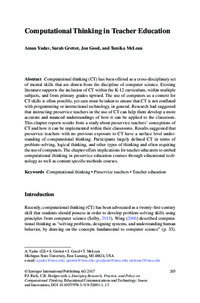Computational Thinking in Teacher EducationZu finden in: Emerging Research, Practice, and Policy on Computational Thinking (Seite 205 bis 220), 2017
  |
 |
 Zusammenfassungen
Zusammenfassungen

Computational thinking (CT) has been offered as a cross-disciplinary set of mental skills that are drawn from the discipline of computer science. Existing literature supports the inclusion of CT within the K-12 curriculum, within multiple subjects, and from primary grades upward. The use of computers as a context for CT skills is often possible, yet care must be taken to ensure that CT is not conflated with programming or instructional technology, in general. Research had suggested that instructing preservice teachers in the use of CT can help them develop a more accurate and nuanced understandings of how it can be applied to the classroom. This chapter reports results from a study about preservice teachers´ conceptions of CT and how it can be implemented within their classrooms. Results suggested that preservice teachers with no previous exposure to CT have a surface level understanding of computational thinking. Participants largely defined CT in terms of problem-solving, logical thinking, and other types of thinking and often requiring the use of computers. The chapter offers implications for teacher educators to embed computational thinking in preservice education courses through educational technology as well as content specific methods courses.
 Dieses Kapitel erwähnt ...
Dieses Kapitel erwähnt ...
 Personen KB IB clear | Owen L. Astrachan , Lenore Blum , Catharine Brand , Thomas J. Cortina , Peter Denning , Mark Guzdial , Susanne E. Hambrusch , John T. Korb , Chris Mayfield , Hilarie Nickerson , Joan Peckham , Alexander Repenning , Amber Settle , Jeannette M. Wing , Aman Yadav , Ninger Zhou | ||||||||||||||||||||||||||||||||||||||||||||||||||||||||||||||||||||||||
 Aussagen KB IB clear | Informatik ist mehr als Programmierencomputer science is more than programming
Problemlöseargument: Informatikkenntnisse helfen auch beim Lösen von Problemen ausserhalb der Informatikproblem solving argument: knowledge in computer science fosters problem solving | ||||||||||||||||||||||||||||||||||||||||||||||||||||||||||||||||||||||||
 Begriffe KB IB clear | computational thinkingcomputational thinking
,  Denken Denken thinking
, LehrerInnen-Bildungteacher training
, thinking
, LehrerInnen-Bildungteacher training
,  Mathematik Mathematik mathematics
, mathematics
,  MINT MINT science, technology, engineering, mathematics
, science, technology, engineering, mathematics
,  Schule Schule school school
| ||||||||||||||||||||||||||||||||||||||||||||||||||||||||||||||||||||||||
 Bücher |
| ||||||||||||||||||||||||||||||||||||||||||||||||||||||||||||||||||||||||
 Texte |
|
 Dieses Kapitel erwähnt vermutlich nicht ...
Dieses Kapitel erwähnt vermutlich nicht ... 
 Nicht erwähnte Begriffe | LehrerIn, Unterricht |
 Zitationsgraph
Zitationsgraph
 Zitationsgraph (Beta-Test mit vis.js)
Zitationsgraph (Beta-Test mit vis.js)
 Zeitleiste
Zeitleiste
 8 Erwähnungen
8 Erwähnungen 
- Proceedings of the 13th Workshop in Primary and Secondary Computing Education, WiPSCE 2018, Potsdam, Germany, October 04-06, 2018. (Andreas Mühling, Quintin I. Cutts) (2018)
- WiPSCE '21 - The 16th Workshop in Primary and Secondary Computing Education, Virtual Event / Erlangen, Germany, October 18-20, 2021 (Marc Berges, Andraes Mühling, Michal Armoni) (2021)
- Exploring Teachers' PCK for Computational Thinking in Context (Sabiha Yeni, Natasa Grgurina, Felienne Hermans, Jos Tolboom, Erik Barendsen) (2021)


- Exploring Teachers' PCK for Computational Thinking in Context (Sabiha Yeni, Natasa Grgurina, Felienne Hermans, Jos Tolboom, Erik Barendsen) (2021)
- Computational Thinking in Education - A Pedagogical Perspective (Aman Yadav, Ulf Dalvad Berthelsen) (2021)

- 2. Computational Thinking Today (Shuchi Grover)
- 8. Professional Development as a Bridge between Teacher Competencies and Computational Thinking Integration (Secil Caskurlu, Aman Yadav, Kyle Dunbar, Rafi Santo)
- WiPSCE '22 - The 17th Workshop in Primary and Secondary Computing Education, Morschach, Switzerland, 31 October 2022 - 2 November 2022 (Mareen Grillenberger, Marc Berges) (2022)

- A Model for Infusing Computational Thinking Skills at Teacher Colleges in a Developing Country (Jocelyn Simmonds, Francisco J. Gutierrez, Nancy Hitschfeld, Catalina Torrent, Cecilia Casanova, Sebastián Toro-Guajardo, Valentín Muñoz) (2022)


- A Model for Infusing Computational Thinking Skills at Teacher Colleges in a Developing Country (Jocelyn Simmonds, Francisco J. Gutierrez, Nancy Hitschfeld, Catalina Torrent, Cecilia Casanova, Sebastián Toro-Guajardo, Valentín Muñoz) (2022)
- Wie schätzen Lehramtsstudierende ihre professionelle digitale Kompetenz ein? - Eine Interventionsstudie zur Förderung der professionellen digitalen Kompetenz mit Fokus auf das Computational Thinking im Themenfeld Bildungsrobotik (Raphael Fehrmann) (2023)


- Künstliche Intelligenz in der Bildung (Claudia de Witt, Christina Gloerfeld, Silke Elisabeth Wrede) (2023)


- Computational Thinking vermitteln - Wie Problemlösekompetenz als Bestandteil digitaler Souveränität erworben werden kann (Raphael Fehrmann, Horst Zeinz)


- Computational Thinking vermitteln - Wie Problemlösekompetenz als Bestandteil digitaler Souveränität erworben werden kann (Raphael Fehrmann, Horst Zeinz)
- Professionelle digitale Kompetenz bei Lehramtsstudierenden fördern! - Wie kann Computational Thinking durch den Einsatz von Bildungsrobotik in der Hochschullehre vermittelt werden? (Raphael Fehrmann) (2024)


 Anderswo finden
Anderswo finden
 Volltext dieses Dokuments
Volltext dieses Dokuments
 |  Computational Thinking in Teacher Education: Artikel als Volltext bei Springerlink ( Computational Thinking in Teacher Education: Artikel als Volltext bei Springerlink ( : :  , 253 kByte; , 253 kByte;  : :  ) ) |
 Anderswo suchen
Anderswo suchen 
 Beat und dieses Kapitel
Beat und dieses Kapitel
Beat hat Dieses Kapitel während seiner Zeit am Institut für Medien und Schule (IMS) ins Biblionetz aufgenommen. Beat besitzt kein physisches, aber ein digitales Exemplar. Eine digitale Version ist auf dem Internet verfügbar (s.o.). Es gibt bisher nur wenige Objekte im Biblionetz, die dieses Werk zitieren.














 Biblionetz-History
Biblionetz-History